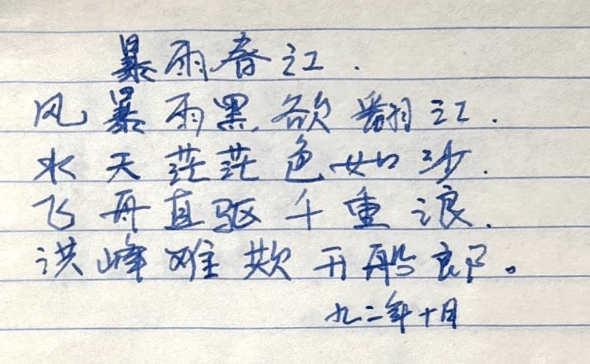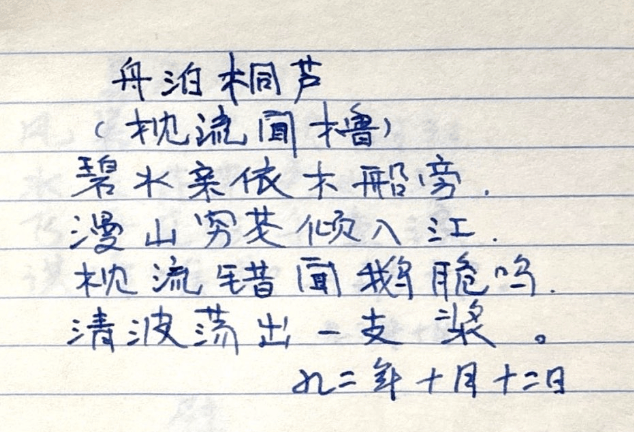
Yan Zhang
Yan Zhang
Yan Zhang
Translations

随潮发舟
烟雨钱塘潮涌浪,
百舟争上势脱缰。
扶摇直上天际处,
唯留空旷水茫茫。
一九九三年十二月
Setting Sail with the Tide
Rain and mist surge alongside the Qiantang tide,
Boats burst free, like wild horses jostling
They shoot up towards the low, grey belly of the clouds
What’s left, miles and miles of empty water.
(December, 1952)

暴雨春江
风暴雨黑欲翻江,
水天茫茫色如沙。
飞舟直驱千重浪,
洪峰难欺开船郎。
九二年十月
Storm on the Spring River
Wind tears dark, turns the river
water and the sky blur, into one pale, sand-like hue.
Boats cut through a thousand crests—
what storms can break who holds the ore?
(October, 1992)

舟泊桐芦
(枕流闻橹)
碧水亲依木船旁,
漫山穷苍倾入江。
枕流错闻鹅脆鸣,
清波荡出一支浆。
九二年十月十二日
Passing Tónglú
(Pillowed on Stream, I Hear an Oar)
Emerald waters nestle wooden boat’s side,
blue hills and the sky spill into the river。
Pillowed on the water, I mistake geese calling—
through clear ripples, an oar emerging.
(October 12, 1992)

春江怀古
碧波浩渺沉夕阳,
犹如金龙腾春江。
达夫1药仙2今何在,
观山桐居各一方。
九二年十一月
Nostalgia by Spring River3
The river drowns dusk in its green sweep—
a golden dragon coils, then leaps through spring’s current.
Where is the sage4 & the healer5 who walked these shores?
One gazes towards mountains; the other dwells in a grass hut
two silhouettes facing across the river’s hum.
(November, 1992)
- 郁达夫(1896–1945),浙江富阳籍著名作家,以《钓台的春昼》等富春江题材作品闻名。他是坚定的抗日志士,逝世后被追认为革命烈士。
- 桐君,中国传统医学的神话人物,被尊为中药鼻祖。相传他居于浙江桐君山,所著《桐君采药录》奠定了中药配伍的基本原则。
- Spring River is the direct English Translation of 春江 chūn jiāng
- Yu Dafu (郁达夫, 1896–1945): a renowned Chinese writer from Fuyang, Zhejiang, known for works inspired by the Fuchun River, such as Spring Days on the Diaoyu Terrace. A prominent anti-Japanese activist, he was posthumously honored as a revolutionary martyr.
- Tong Jun (桐君): A mythical figure revered as the father of traditional Chinese medicine, who resided on Tongjun Mountain in Zhejiang. His Tong Jun’s Materia Medica established foundational principles for herbal medicine.
老鼠梯前大小洋,
溪中黄狗尾巴长,
莫看百尺纤来短,
一寸愁如一寸肠。
小群滩上大群滩,
多少长年缩手看,
饭甑岩高哪得上,
算来都比白沙滩。
锦水溪头溪雨多,
腊溪溪口浪生花,
石帆堪与行人便,
半日东风道下河。
横竹肩头挽巨舟,
佛头岩下回生愁,
行人眼泪声声落,
似听哀猿到峡州。
At Rat’s Ladder
Rat’s Ladder Rapids churns
gold between shores. Dog tails in the current:
fierce, and cold, and long.
Don’t speak of brief distances when for these
one hundred feet—inches are stitched
by sorrow, which is to say gut-twist grief.
Small Shoal to Great Shoal mile on grinding mile.
How many lifetimes watched
through these numbed hands all the while?
Steamer Rock dares us to climb? No chance—They’re worse
than White Sand’s slow, drowning
trance—that silt kiss swallowing our light.
Brocade Creek’s head is where rain never lifts
its needles. At Wax River’s mouth, there–
white-maned waves buck & snap like wet sheets.
Stone Sail Ridge—half a day’s wind-lifted grace,
unlocks the river’s throat with east wind’s shove—
herds us downriver into twilight’s bruise.
Bamboo poles groan–as they shoulder the hull’s
dead weight. Beneath Buddha
Head Rock, sorrow births itself anew.
Wayfarers weep–where the wild rapids roar
back like gibbons wailing through Gorge Pass
once more of memory’s raw throat.
Their echo never washes clean.
摇船
水里摇船水里歇,
水里摇船能得几个大铜钱?
六月晒得泥鳅黑,
十二月冻得紫蝴蝶。
–
水里摇船水里歇,
水里摇船能得几个大铜钱?
穿身破衣千个穷心结,
头上戴个井栏圈。
伸脚伸去到灶前,
缩脚缩在下巴前。
–
水里摇船水里歇,
水里摇船能得几个大铜钱?
绿汪汪水当褥子,
丝草蓑衣盖身体。
万台眼浪当枕头,
芦扉眼里望青天。
Rowing
A translation of 《摇船》 from 《明清民歌选》
Water bears my boat, water grants no rest.
How many copper coins for my life river-bent?
June chars loaches black and lean.
December frostbites purple butterflies.
–
Water bears my boat, water grants no rest.
How many copper coins for my life river-bent?
I wear a shirt stitched by a thousand knots of poverty,
and place a well curb on my head.
I stretch my legs, they scrape the stove
And tuck my knees, they freeze beneath my chin.
–
Water bears my boat, water grants no rest.
How many copper coins for my life river-bent?
Green water for my hard bed,
A straw-cloak shields my frame,
Ripples like ten-thousand eyes, my pillow.
Through the reeds, I watch the sky overhead.
在我吸烟的时候
在我吸烟的时候
我看见无限的田埂上遥远的一个人
我看见了麻雀
看见了故乡的天空
有些字不能读出来
我看见了父亲卖掉的马,黑溜溜的湿润的眼睛
我看见瘦弱的我走在城里
因为两块钱放弃了一个鸭蛋
我看见了
生活
生活中因为巨大的梦而忽略的角落
我看见了争吵背后说不出的爱
我看见了被看见的一切
那些虚弱的孩子
一朵花苞被怀抱不敢开放
我看见聋哑人说话
我看见了他们喉咙上的疤痕
我看见了母亲
米缸,和立春时贴好的对联
因为岁月不断的脱落又贴上
我看见了最后的地平线
一把手术刀和太阳
她轻轻的呼吸,说话时因为疼痛
避开了年轻的名字
我们没有感受过出生的喜悦
并且轻视死亡
我们不停的赶路,麻木早已覆盖脚踝
剩下什么,让你旋转着双臂
以舞蹈的方式
你说:
我看见了风
看见了,大海
While I Smoke
Translated from “迎着北风一直走” by the Chinese poet Xiuhua Yu
While I smoke
I see a figure on the endless ridges of the fields
I see sparrows
I see the sky of my hometown
Some words cannot be uttered
I see the horse my father sold, wet, black, glistening eyes
I saw the thin child I was walking in the city
Passing up an egg for two yuan
I see
life—
the corners of life overlooked because of great dreams.
I see love unspoken behind quarrels.
I see all that has been seen
those fragile children
a flower bud held tight, afraid to bloom
I see the mute speak
and the scar across their throats.
I see mother,
the rice jar, and the couplets pasted at spring’s arrival
peeled and re-pasted as years pass.
I see the last horizon,
a scalpel and the sun.Her soft breath, her voice avoiding youth’s name
because of pain
We never felt the joy of birth
nor feared death
We hurry onward numbness long crept past our ankles.
What’s left that makes you spin your arms
like dancing
You say:
I see the wind.
I see the sea.迎着北风一直走
开始的时候我昂着头,后来就低下了
这样的时候,他们应该点燃灯盏,但是没有。
树木和落叶都在奔跑,与我逆向
离开村庄,我觉得还能走很远
没有低悬的云朵挡住我的去路
也没有另外的村庄指引我的方向
哦,怀抱雷霆的悲伤的女人
闪电在身体里生锈,我不能掏出
为那些在一个个漩涡里看着我的人啊
这是一个御寒的过程
如同把血液洒在生存
把爱抵当给死亡
Walk Along North Wind
*Translated from “迎着北风一直走” by the Chinese poet Xiuhua Yu
At the start I held my head high, then lowered it
At this hour, they shall light up lanterns, but they didn't
Trees and fallen leaves are running, away from me.
Away from the village, I think I can go far
No low hanging clouds block my path
Yet no other village to guide me on
Oh, a depressed woman holding thunder
lightening rust inside my body, I can’t take out
for people who watch me in one swirls after another
This is a process of keeping out the cold
like spilling blood on life
and pledging love for death
我爱你
巴巴地活着,每天打水,煮饭,按时吃药
阳光好的时候就把自己放进去,像放一块陈皮
茶叶轮换着喝:菊花,茉莉,玫瑰,柠檬
这些美好的事物仿佛把我往春天的路上带
所以我一次次按住内心的雪
它们过于洁白过于接近春天
在干净的院子里读你的诗歌
这人间情事恍惚如突然飞过的麻雀儿
而光阴皎洁
我不适宜肝肠寸断
如果给你寄一本书,我不会寄给你诗歌
我要给你一本关于植物,关于庄稼的
告诉你稻子和稗子的区别
告诉你一棵稗子提心吊胆的
春天
I Love You
*Translated from “我爱你” by the Chinese poet Xiuhua Yu
Living eagerly, getting water, cooking, taking meds on time
I put myself inside ( ) when the sun is out, like putting in an orange peel
Switching between teas: chrysanthemum, jasmine, rose, lemon
These glorious things seem to take me on the path to spring
So time and time I press on the snow in my heart
They are too pristine, too close to spring
In a neat yard, I’m reading your poems. These things of our world
are in a trance like sparrows that pass by
but time is bright and clear. I’m not up for sorrow-stricken
If I send you a book, I won’t send you poetry
I’ll send you one about plants, about crops
tell you the difference between rice and barn
Tell you about a barn’s anxious
Spring
我身体里也有一列火车
但是,我从不示人。与有没有秘密无关
月亮圆一百次也不能打动我。月亮引起的笛鸣
被我捂着
但是有人上车,有人下去,有人从窗户里丢果皮
和手帕。有人说这是与春天相关的事物
它的目的地不是停驻,是经过
是那个小小的平原,露水在清风里发呆
茅草屋很低,炊烟摇摇晃晃的
那个小男孩低头,逆光而坐,泪水未干
手里的一朵花瞪大眼睛
看着他
我身体里的火车,油漆已经斑驳
它不慌不忙,允许醉鬼,乞丐,卖艺的,或什么领袖
上上下下
我身体里的火车从来不会错轨
所以允许大雪,风暴,泥石流,和荒谬
I too have a train inside me
*Translated from “我身体里也有一列火车” by the Chinese poet Xiuhua Yu
but I never show anyone. It has nothing to do with secrets
Full moon x 100 can’t move me. Moon’s sirens
I muffled
But some people board, some get up, some toss fruit peels from behind windows
and handkerchiefs. Some say it has to do with spring
It’s purpose is not to stay, it’s to pass
that tiny little plain, dew dazed in the breeze
cottages are low, smoke from chimneys swaying
That little boy looks down, sits back to the light, tears undried
A flower in his widens its eyes
Stare at him
The train inside my body, oil paint in blotches
It’s not frantic, it allows the drunk, homeless, street performers, or whatever
to lead



